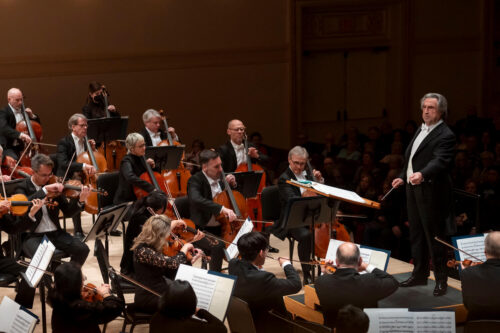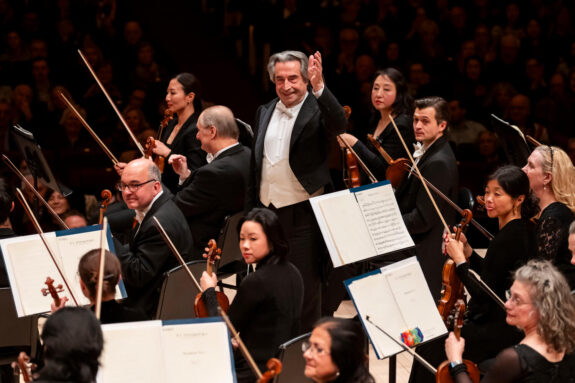 United States Bellini, Verdi, Tchaikovsky: Chicago Symphony Orchestra / Riccardo Muti (conductor). Carnegie Hall, New York, 21.1.2025. (ES-S)
United States Bellini, Verdi, Tchaikovsky: Chicago Symphony Orchestra / Riccardo Muti (conductor). Carnegie Hall, New York, 21.1.2025. (ES-S)

Bellini – Overture to Norma
Verdi – The Four Seasons from I vespri siciliani
Tchaikovsky – Symphony No.4 in F minor, Op.36
Returning to Carnegie Hall for a single performance with his cherished Chicago Symphony Orchestra, Riccardo Muti, now honored as the ensemble’s Music Director Emeritus for Life, devoted the first half of the concert to two Italian works.
The overture to Bellini’s Norma exemplifies bel canto orchestral writing, and Muti’s interpretation brought a thoughtful balance of dramatic intensity and elegance to the performance. He allowed the melodies to breathe naturally, shaping the sweeping phrases and dynamic contrasts with understated precision, sidestepping formulaic tendencies. The orchestra responded with clean articulation and phrasing, emphasizing clarity over excess. Strings and winds sang with warmth and vocal expressiveness, elevating the overture from a mere introduction into a compelling, independent statement.
The ballet Le quattro stagioni (The Four Seasons) may have been composed to satisfy the conventions of French grand opera – and later dismissed by Verdi as unnecessary – but it possesses undeniable charm, with its vivid orchestral imagery and melodic elegance. Under Muti’s meticulous direction, the Chicago Symphony Orchestra brought the score to life with remarkable sensitivity and color, emphasizing its orchestral textures and vividly capturing the character of each season, while subtly downplaying its longueurs. Particularly memorable were the solo moments: Stephen Williamson’s clarinet conveyed poignant yearning in ‘Spring’, while William Welter’s oboe lent ‘Summer’ a languid sensuality, both solos rendered with delicate expressiveness.
Anchored in Russian folklore, the Finale: Allegro con fuoco of Tchaikovsky’s Symphony No.4 revealed an unexpectedly Italian character on Tuesday night. While Tchaikovsky, who spent significant and productive periods of his life in Florence and Venice, may not have explicitly incorporated Italian sounds into the score, those influences likely lingered in his compositional background. In Muti’s interpretation, a subtle interplay of influences emerged. The juxtaposition of the Russian folk tune ‘In the Field Stood a Birch Tree’, tinged with melancholy, with the fast-paced triple-meter sections reminiscent of an Italian tarantella – evoking the spirited energy and swirling motion of a street festival – felt invigorating, infusing the entire movement a sense of newfound vitality.
If the blazing brass at the opening of this warhorse recalled the orchestra’s bold sound from Georg Solti’s era, Muti’s distinct approach to the soundscape – more expressive and smoothly mellifluous – quickly became evident. His nuanced handling of tempi, used to build tension and highlight shifts in mood, brought a sense of immediacy and purpose to the performance. The violins introduced the waltz-like melody in the first movement with a sense of yearning, delicately offset by the darker undercurrents of the lower strings and winds. In the Andantino, the pensive theme introduced by the oboe floated gracefully before being echoed with touching poignancy by the bassoon, setting a tone that alternated gently between melancholy and tender warmth. Muti’s attention to coloristic nuances added an emotional depth to the interpretation. The pizzicato Scherzo sparkled with clarity and charm as the nimble plucking of the strings seamlessly blended with the winds’ playful interjections and crisp staccato bursts of the brass. Muti’s precise direction added a dance-like lightness to the movement, with dynamic contrasts and rhythmic precision lending it an effervescent character.
Always an admirable advocate for the music of his homeland, Muti selected Giuseppe Martucci’s Nocturne, Op.70, No.1, as an encore – a work evidently close to his heart (he had conducted it at Carnegie Hall in 2018). Before the performance, Muti offered graceful remarks about Martucci, emphasizing the composer’s significance in Italian music history and the admiration he inspired in Arturo Toscanini – the legendary conductor, antifascist and teacher of Muti’s teacher. Charming and heartfelt, the piece, with its Mahlerian touches, conveyed an understated elegance. Yet, like the other two Italian works on the program, it ultimately lacked the depth required to achieve lasting significance.
Overall, the performance was a testament to how much the Chicago Symphony owes to Riccardo Muti’s transformative thirteen-year tenure. He leaves behind a more balanced ensemble, equally celebrated for its precision, warmth and lyricism. As Klaus Mäkelä prepares to take the helm, he is set to inherit not only one of the world’s finest orchestras but also the legacy of Muti’s artistry and unwavering commitment to expressive music-making.
Edward Sava-Segal
Featured Image: Riccardo Muti and the Chicago Symphony Orchestra at Carnegie Hall © Todd Rosenberg

Bellini’s Norma Overture is resonant from the outdoor performance at Arena di Verona, as I recall its resonating acoustics in the 30,000 seats amphitheater.
More Italian music please!